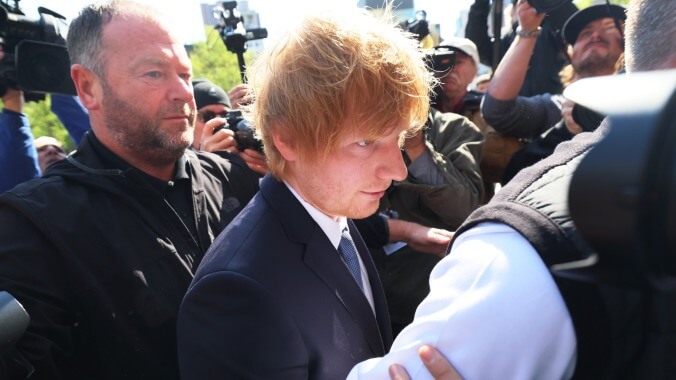Ed Sheeran takes the stand in "Let's Get It On" copyright trial
The heirs of Marvin Gaye's co-writer Ed Townsend sued Sheeran in 2017, alleging "striking similarities" between "Let's Get It On" and "Thinking Out Loud"

Ed Sheeran took the stand today in a trial nearly five years in the making regarding his 2014 track “Thinking Out Loud,” which has been accused of sharing “striking similarities” with Marvin Gaye’s 1973 classic “Let’s Get It On.” The trial will determine whether or not Sheeran infringed on copyright in crafting “Thinking Out Loud,” which won Sheeran a Grammy in 2016.
The lawsuit comes from the heirs of Ed Townsend, Marvin Gaye’s co-writer on the sensual, soulful standard. Townsend’s heirs allege that Sheeran’s 2014 hit “Thinking Out Loud” features “overt common elements” that directly violate their copyright. Although the lawsuit was first filed in 2017, it has faced multiple delays.
During questioning today (via People), Sheeran made it clear that he believes it’s normal for pop songs to use similar chord progressions, citing various examples (like Van Morrison’s “Crazy Love” and Lewis Capaldi’s “Someone You Loved”) and suggesting that “most pop songs are built on building blocks that have been freely available for hundreds of years.”
The jury for the trial, which is taking place in Manhattan, has been instructed not to focus on the lyrical content of the song, but instead “only consider the raw elements of melody, harmony and rhythm that make up the composition of ‘Let’s Get It On,’” per NBC News. Both songs will be played aloud in court for the jury to compare.
“The two songs share versions of a similar and unprotectable chord progression that was freely available to all songwriters,” they said in a court filing.
The Townsends have pointed to videos of Sheeran segueing during live performances between “Thinking Out Loud” and “Let’s Get It On,”— they originally sought to include video of such a performance in the trial, but presiding Judge Louis L. Stanton denied the motion. Conversely, Sheeran’s attorneys have argued that any likeness between the songs stems from the foundational aspects of pop music, as he said today in court, and he also pointed out that, if he were really guilty of consciously ripping off “Let’s Get It On,” then he would have to “be an idiot” to stand onstage “in front of 20,000 people” and play the two songs together.
Of course, Gaye has a looming presence in the DNA of popular music, which has gotten other artists in hot water before. Notably, Gaye’s heirs won a lawsuit in 2018 against Robin Thicke, Pharrell, and T.I. over their unfortunately seminal hit “Blurred Lines” after accusing the trio of copyright infringement over the song’s similarity to Gaye’s 1977 hit “Got To Give It Up.” The courts awarded Gaye’s estate $7.4 million at trial— although the number was eventually lowered to $5.3 million, the sum remains one of the largest payouts from a copyright trial in recent memory.
Sheeran has gone to court (and settled outside of it) before over his music, winning a U.K. copyright trial last year that compared his 2017 song “Shape Of You” to the 2015 track “Oh Why” by Sami Chokri, who performs as Sami Switch. In a statement released after the verdict, Sheeran took the industry to task over the growing prevalence of copyright claims.
“Whilst we’re obviously happy with the result, I feel like claims like this are way too common now and have become a culture where a claim is made with the idea that a settlement will be cheaper than taking it to court, even if there is no basis for the claim,” Sheeran shared on Twitter after the verdict. “It’s really damaging to the songwriting industry.”
Creative freedoms aside, it’s worth noting that much of Sheeran’s inspiration comes from pioneering Black creatives. His music—which undeniably draws from R&B, soul, and doo-wop—falls in line with an industry tradition even more well-traveled than copyright infringement lawsuits: young white artists seemingly cribbing from creative strides made by Black predecessors.
“Mr. Sheeran blatantly took a Black artist’s music who he doesn’t view as worthy as compensation,” Ben Crump, a Civil Rights attorney who represents the Townsend family outside of the trial, shared in a March 31 news conference.
As the trial—expected to last roughly two weeks—forges on, Sheeran is gearing up to release a new album and embark on an extensive U.S. stadium tour. With the physical, emotional, and financial costs of touring at an all-time high—especially for international artists, who could face a nearly 250% increase in the price of touring visas under a new Homeland Security proposal — it’s unclear how a loss would affect these plans.